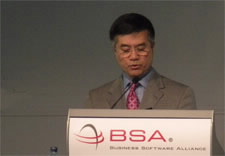NIST Kicks Off New National Cybersecurity Center of Excellence
Guest blog post by Donna Dodson, Chief, Computer Security Division and Acting Director, National Cybersecurity Center of Excellence, National Institute of Standards and Technology
This week, Commerce's National Institute of Standards and Technology (NIST) hosted a workshop to kick off the National Cybersecurity Center of Excellence (NCCoE), a new public-private collaboration that will bring together experts from industry, government and academia to design, implement, test and demonstrate integrated cybersecurity solutions and promote their widespread adoption.
IT is central to financial, communications, healthcare and physical infrastructures and even entertainment systems. It is also under constant attack by cybercriminals looking to steal business data, personal information and devices, or disrupt private and government business with malicious code, denial of service and Web-based attacks.
We were excited to bring together representatives from various industry sectors (health, utility, financial, and more), along with those from government agencies, academia and other organizations to learn how the center will operate and how the public can participate. In the photo here, NIST’s Curt Barker, Karen Waltermire, and Henry Wixon are seen explaining how interested parties can get involved.
The NCCoE will provide a state-of-the-art computing facility where researchers from NIST can work collaboratively with both the users and vendors of products and services on holistic cybersecurity approaches. NIST is hosting the center in collaboration with the state of Maryland and Montgomery County, Md.
By providing a test bed where new ideas and technologies can be tried out before being deployed, the center provides the opportunity to thoroughly document and share each solution, supporting specific industry sector business challenges. This will encourage the rapid adoption of comprehensive cybersecurity templates and approaches that support automated and trustworthy e-government and e-commerce.









